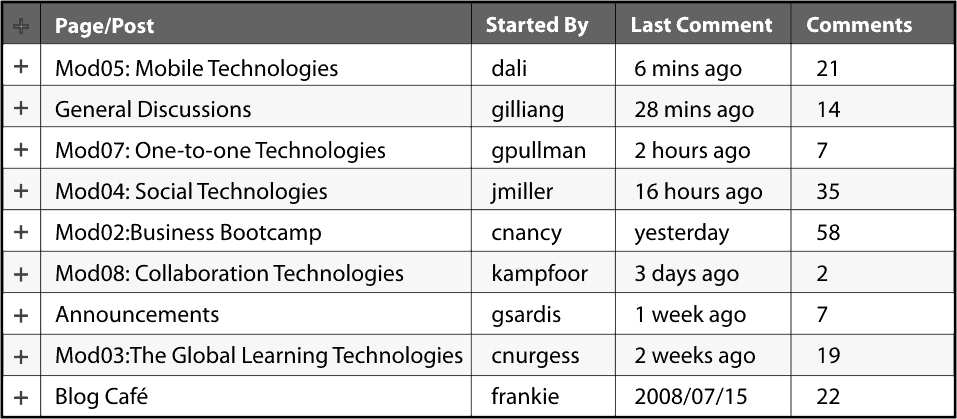I mentioned a couple posts back that we are running some courseblogs this semester on WordPress, with a range of approaches and configurations. One of these courses has all of the students working within one multi-authored courseblog, posting assignments and engaging in follow-up discussions via the comments… This particular course is part of a fully online degree program, one in which the vast majority of interactions happen via WebCT Vista.
I’ve been at turns surprised, disheartened, and fascinated by the feedback we have been getting. A common complaint is a sense of feeling lost and overwhelmed by the structure of successive posts and comments… not knowing where discussions begin and end.
I think I understand where these students are coming from, they have been conditioned to expect a certain format of threaded online discussion and they have gotten good at using that format… and now they are being asked to change. Speaking for myself, I have the posts and comments RSS loaded into my Google Reader account and find following the threads to be dead easy. But that reflects my own conditioning. In all honesty, when I do my occasional round of teaching inside Vista, I find the discussion forum to be clunky and confusing, and I find myself longing to see what my buddies in the blogosphere are talking about in the relative comfort, speed, portability and ease of my Google Reader page.
And there’s no question that having thirty or more students posting and discussing inside a single blog generates a lot of activity to track. We have considered using a system like bbPress or one of the forum plugins, but in a sense we would prefer to augment the existing comment functionality rather than adding another layer of stuff for people to track.
My colleague Novak Rogic has posted his proposed approach, which is to create an enhanced “Recent Comments” page. Here’s his wireframe:
Novak suggests that we can use AJAX so that the ‘+’ sign on the left can expand to display the comments, and maybe we can integrate this menu with some of the threaded comments plugins that have already been developed.
I think this is quite promising… Is there another plugin that already does this? Any other thoughts? It might be better to offer feedback on Novak’s post, as unlike me he has the advantage of actually knowing what he is doing.
As of a half hour ago, we’ve also got a working test version, if anyone is interested in testing or collaborating.

um… HELL yeah sign me up…
I haven’t seen anything like this, and we at UMW Blogs would certainly be game for testing. It is an excellent strategy for re-thinking the blog for multiple uses, all hail UBC and Novak yet again!
I certainly like that interface, in that you can see which post was commented on most recently. One of the problems that I always feel as a blog visitor is that I don’t know where comments have been posted. As the blog owner, I do, but I don’t as the visitor. It’s one of the reasons I’m always sceptical of group blogs – and where i feel that discussion boards (even those as clunky as Vista’s!) win – it’s easy to see what’s new if you didn’t actually create the first post.
I don’t know enough to collaborate on this, but I can certainly test on my development site and in the two course sites we will be running starting in January.
Thanks for posting this Brian!
It took me longer to write the post about it
(http://blogs.ubc.ca/novak/2008/10/29/forum-like-blog-comments/) than for Enej to actually create it!
We will put it up very soon and also check it in @ wordpress codex.
Thanks Brian for being on top of this. I don’t find the wordpress interface difficult, but I know my classmates are frustrated. This looks like a great solution to discussions.
On another note the other issue with WordPress is that professors assign independent projects, and it is not possible to create them in the same WordPress blog, so we end up with sites to navigate to all over the place. If there were a way to keep everything within the WordPress interface it would be much easier. Perhaps it shouldn’t be an option…
Hi Carolann,
What exactly you mean by assigning independent projects?
Perhaps using categories could be the solutions for this?
I’d be most interested.